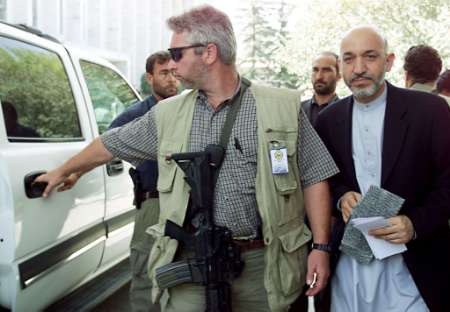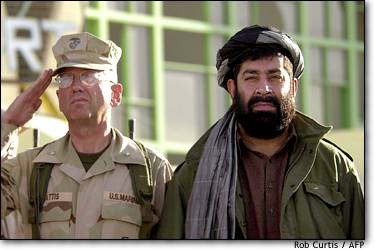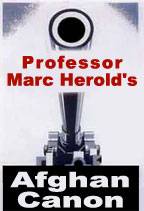Karzai as a Bush Echo Box
by Marc W. Herold
Departments of Economics and Women's Studies
Whittemore School of Business & Economics
University of New Hampshire

Karzai with his old friends, getting into a Toyota Landcruiser, leaving the international landmine conference in Kabul
POSTED SEPTEMBER 6, 2002 --
During late July-early August, three mentions of Afghan civilian casualties have been made. These are interesting less for their numerical accuracy and more for their political content. The Bush Administration has persistently proclaimed the accuracy of U.S. bombing and the few though 'regrettable' civilian casualties. Disregarding widespread and increasing popular revulsion at home, the Karzai regime has also minimized these low numbers. Exactly three weeks after the deadly U.S. bombing attack of a wedding party in Uruzgan which was roundly criticized for relying upon flawed intelligence and exhibiting a 'shoot first and ask questions later' U.S. military mentality, the Karzai regime in Kabul told the BBC that fewer than 500 civilians were believed to have been killed in U.S. airstrikes during the entire Afghan campaign.1
A couple days later Gary Thomas of the U.S. Government's propaganda outlet, Voice of America News, mentioned that "published reports suggest that as many as 400 civilians may have been killed by errant U.S. bombs."2 And on the National Public Radio show 'The Connection' during an August 2nd program devoted to the topic of civilian casualties, Sarah Sewall, program director of the Carr Center for Human Rights Policy [whose director is Michael Ignatieff, primus interpares of the interventionist New Humanitarians3], quickly agreed with her two fellow guests - retired military officers - that Afghan civilian casualties were in the low hundreds and then went on to chatting about which weapons systems can best be used to attain U.S. military goals in the area.4
Political counting of the dead is revealed at its very best: data, facts and research are irrelevant.
Just to round out things, on the same day, Karzai in Kandahar flanked by his trusted old friends, U.S. Special Forces 'protectors', sided with the U.S. against the early leaked U.N. report which accused U.S. forces of removing evidence and tying up Afghan women during the wedding party attack.5 Karzai uttered some rather incoherent sentences about alleged inaccuracies in the original version [though never stated which], about how the original U.N. document "is a report of the first day when there were lots of people and misinformation" [but the U.N. team visited the scene three days after the attack], and about how people in Kakarak would have told him the truth during his visit [not fearing his entourage of heavily armed U.S. Special Forces bodyguards]. "The report that the U.N. has later produced is the one that speaks the truth and also the Afghan report and the U.S. reports are the ones you should rely on," Karzai added. He gave no details of the contents of any of the three reports.
It might also be recalled that in the days after the wedding party attack, a sundry group of Afghan governors of southern provinces led by Kandahar's Gul Agha Shirzai6, proposed forming their own rapid response military force and that future U.S. operations be approved by Afghan authorities. The idea was quickly shelved after a brief visit to Kandahar by 'the boss', General D.K. McNeill. Gul Agha, a violent man of very few principles, retracted ['clarified'] his earlier position, adding "...we will even be ready to sacrifice ourselves for American soldiers to spare lives."7 Gul Agha as governor of Kandahar before the Taliban, was known for his cruelty, ruling his militia with bullying and beatings, and for letting his unruly men run free.8

Governor Gul Agha Shirzai and General McNeill at Kandahar airport
His Master's Voice hath spoken.
-- 30 --
Footnotes
1. "Afghans Defend US Air Strikes," BBC News Online [July 21, 2002]
2. Gary Thomas, "Afghan Official Calls for Investigation of Civilian Casualties," VOA News [July 25, 2002].
3. For example see his "The Case for a Committed American Imperialism," New York Times Magazine [July 28, 2002], which is in turn, appropriately criticized in Gilles d'Aymery's column in Swans Commentary [July 29, 2002] at www.swans.com/library/art8/ga136.html
4. "Civilian Casualties," National Public Radio, The Connection [August 2, 2002].
5. First mentioned in Dumeetha Luthra, "US Accused of Airstrike Coverup," The Times [July 29, 2002], later in Paisley Dodds, "Afghan President: U.N. Report on U.S. Air Strike Was Flawed," Associated Press [August 2, 2002 at 07:52] and Simon Denyer, "Karzai Denies Cover-Up of Fatal Afghan Wedding Raid," Reuters [August 2, 2002 at 8:04 AM ET].
6. Peter Maas "Gul Agha Gets His Province Back," New York Times Magazine [January 6, 2002]: http://www.petermaass.com/core.cfm?p=1&mag=74&magtype=1
7. Regan Morris [of the Associated Press], "Afghan Governor Clarifies U.S. Remarks,"" Washington Post [July 21, 2002]. Gul Agha might have been gently reminded that his forces executed 160 disarmed, captured Taliban outside the village of Takteh Pol between Kandahar and the border, on the Muslim day of Friday, November 23rd. Apparently, 7-8 U.S. military personnel were present and had tried unsuccessfully to prevent the executions ["160 Taliban Executed, Admits Warlord," Dawn [November 29, 2001] at http://www.dawn.com/2001/11/29/top5.htm ]. Before marching into Kandahar protected by U.S special forces, he had exhorted his troops to show no mercy to 'Arabs and Pakistanis'. He carried through with the slaughter of foreign Taliban supporters at Kandahar airport and the execution on January 28th of six foreign Taliban supporters barricaded in Mir Wais Hospital [see Peter Symonds, "Afghanistan: US Forces Carry Out Cold-Blooded Murder at Kandahar Hospital," wsws.org [February 1, 2002] at http://www.wsws.org/articles/2002/feb2002/afgh-f01.shtml].
8. Norimitsu Onishi, "Afghan Warlords and Bandits are Back in Business," New York Times [December 28, 2001]: B1 at www.asap-net.org/archive/warlords.html
